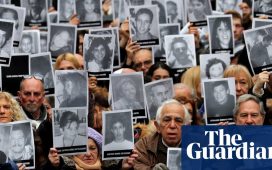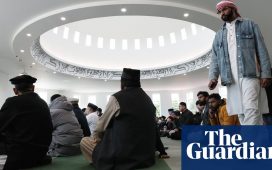Richard Thompson is drinking mint tea in a Hampstead coffee shop – he doesn’t touch coffee or alcohol – and between Islam and cricket, he’s discussing the remarkable guest list for his upcoming 70th birthday celebration at the Royal Albert Hall in London. “I don’t like being the centre of attention, strange as it sounds,” he insists. “I just want to have a few friends over.”
The man the LA Times once hailed as “the finest rock songwriter after Dylan” and “the best electric guitarist since Hendrix” will switch between electric and acoustic guitars, and hopes that “most guests will have time to do a couple of songs”. The 15 guests will include Pink Floyd hero David Gilmour, who has featured alongside Richard in a Rolling Stone magazine best ever guitarist list, and who, as a soloist, covered Richard’s 1975 song Dimming of the Day. “He’ll do that,” says Richard. “And then do something of his … or Floyd’s. He has always been a nice guy and we share a love of all things Fender.”
The cast will also include old and new British folk heroes, from Martin and Eliza Carthy to Olivia Chaney. And then there will be Harry Shearer, the American actor and comedian, reviving his role as Derek Smalls from Spinal Tap, along with his wife Judith Owen who joined Richard in 2006 for the 1,000 Years of Popular Music project, in which they reworked anything from Sumer Is Icumen In to Britney Spears.
Richard Thompson may be a virtuoso guitarist, but he insists that it’s the songs that are most important to him. “Most of what I do revolves around the song. If I play guitar, I’m not interested in playing instrumentals. I like playing guitar to accompany a voice, or if there is a solo, then extending the narrative of the song.” So are his thrilling, spontaneous-sounding acoustic or electric guitar solos inspired by the song? “Yes, it’s that way round. Absolutely.”

For more than 50 years, his songwriting output has been remarkable, from the gently bleak and lyrical ballads that are performed regularly in folk clubs (where some listeners probably think they are traditional) through to equally bleak, upbeat favourites like Tear-Stained Letter or the pounding, edgy and emotional stories of foreboding on his latest electric album, 13 Rivers.
It’s a set filled with religious imagery, “because I love the King James Bible, a beautiful piece of poetry, and you have to speak to people in a language that’s familiar”. And it was written, he says, “in a difficult personal time”. Last year, after the ending of his second marriage, to Nancy Covey, he quit California to move to New Jersey, home of his new partner, singer-songwriter and author Zara Phillips. But he insists that the album is not autobiographical. “I have no perspective on what I am doing. I write a song and think, ‘Where does this come from?’ Me? I wrote this? I write fiction … I’m just enjoying myself, throwing lines together. I think it always reflects your own experience and feelings, but it isn’t always in a way that’s clear. If you find something honest enough in yourself then it will be universal.”
But The Storm Won’t Come – “There’s a smell of death where I lay my head…” – is surely about his divorce? “But you’ve also got Trump in the White House, so maybe there’s a little bit of that in there as well.” And Her Love Was Meant For Me, isn’t that straightforward? “It’s a song I find very confusing, actually.”
Richard insists that the Albert Hall show won’t be a retrospective, but it will certainly be nostalgic. Another guest will be Hugh Cornwell, of Stranglers fame, who played with Richard in his first band, Emil & the Detectives, when they were both 14 and pupils at William Ellis school near Hampstead Heath. Then there will Simon Nicol and Ashley Hutchings, who along with Richard were the core trio in different teenage bands who evolved into the first Fairport Convention. They will be joined by Dave Mattacks, the drummer who joined Fairport a little later, alongside the late Sandy Denny, to record Liege and Lief, the classic album released 50 years ago that kickstarted British folk-rock. “We might dip our toe into that repertoire,” says Richard. “And someone is going to do a bit of Sandy.”
So how did he feel about that era now? “We thought that if we are in the charts and it’s taken seriously, it could change peoples’ attitudes to British music and you might have people stopping using American accents when singing. It was totally revolutionary at the time. Rock music with an element of British traditional music in it was pretty much our innovation, and I’m very proud of that. And when people in other countries saw we did, it was possible for them to contemporise their own cultures.”
After the Fairports, Richard recorded a serious of glorious, mostly bleak albums with his first wife Linda Thompson, a powerful, evocative singer whose career has been marred by dysphonia, a larynx disorder that makes it increasingly difficult for her to sing. She’ll also be there, along with their musical children, singer-songwriter and producer Teddy Thompson and Kami Thompson, who works with her husband, the Pretenders guitarist James Walbourne, in the Rails. And to complete the family line-up there will Richard’s new partner Zara Phillips.

So how would Linda feel if Zara sings one of the Richard and Linda classics such as I Want to See the Bright Lights Tonight or Wall of Death, as seems likely? “It wouldn’t seem odd,” Linda tells me. “If it were Richard and Emmylou Harris I might be a bit miffed, because she is a genius! And I like Zara. And Richard has changed has a lot. He is much nicer and he’s happy – so that’s great”.
It was during his marriage to Linda that Richard discovered Islam. The son of a Scottish policeman, he was brought up as a Presbyterian “which I was not interested in. I became a Muslim when I was 23 and have been one ever since.” He discovered Sufism, a mystical form of Islam, after visiting “a very old esoteric bookshop, Watkins in Covent Garden, and started reading about it”. On the cover of their 1975 album Pour Down Like Silver, he and Linda are dressed in turban and headscarf, and for the next three years the couple disappeared from the music scene to spend much of their time in Islamic communities in London and then Norfolk. “And it was a community, not a commune,” said Richard. “Commune implies sharing out the carrots!”
Linda hated it. “Sufism had appealed to me, but the guy who ran it was bit of a tyrant. There was lots of praying and guilt, and women were so subservient.” Richard, who was attracted to Sufism by “the nobility of being … it seemed like the way human being should be,” agreed that it wasn’t ideal. “It was full of human foibles. People are lustful, jealous, God knows what. But then we visited a sheikh in Morocco and saw the other side of it. And it was all wonderful.”
By 1982 the marriage was at an end, but the deserved success of the Shoot Out the Lights album led to an infamous US tour. “I was living on booze and antidepressants,” Linda says. “I was so angry I was kicking and hitting Richard on stage. I trashed a dressing room, stole a car and got arrested. But it was good for my voice. I guess because I was so heartbroken it freed me up. The dysphonia wasn’t too bad in those days. At the end of the tour Richard rang and said: ‘Bruce Springsteen is male singer of the year and you are female singer of the year.’ Was it in Time or Rolling Stone? I think both. Like everything, good comes out of bad.”
So has she forgiven him? “I have. It was a bad time but – Jesus Christ – it was 40 years ago. Forget it!” But she is “kind of dreading the Albert Hall” because “as a performer you’d love to get up and wow the crowd, but I never know what will come out of my mouth. But I’ll do something. It’s going to be good.”

After the split, Richard moved to California, remarried, and relaunched his career. “At aged 33, when I started singing solo, they treated me as a new artist and put me on college radio. So my audience in the States was 10 years younger than me, and it still is. And very, very slowly I did well. It was word of mouth. I toured America relentlessly, and I still do, and it’s still growing, which is amazing. Without having a hit record, more people come to shows now than they ever did.” As for the move to the east coast, “I was ready for a change. But being a performing musician I do 100 shows a year, and I’m away 150 days, so where you are based is less important.”
Does he have problems as a Muslim living in the States in the Trump era? “Trump has ramped up bigotry considerably. If you are not a white Christian, the implication is that you’re not a real American. It’s incredibly destructive, divisive, and harmful. We’ll see how it plays out – but the fact is that you still have more religious freedom in America or Britain than you do in a whole lot of Middle Eastern countries.”
Thompson is a cricket enthusiast – he cheerfully recalls his appearance on Test Match Special five years ago, singing 1952 Vincent Black Lightning – and he insists he “never wanted to be culturally absorbed by America. I can contribute more having a culturally British point of view.” Even in the midwest, he can still knock them for six.
• Richard Thompson: 70th Birthday Celebration is at Royal Albert Hall, London, Monday 30 September.






